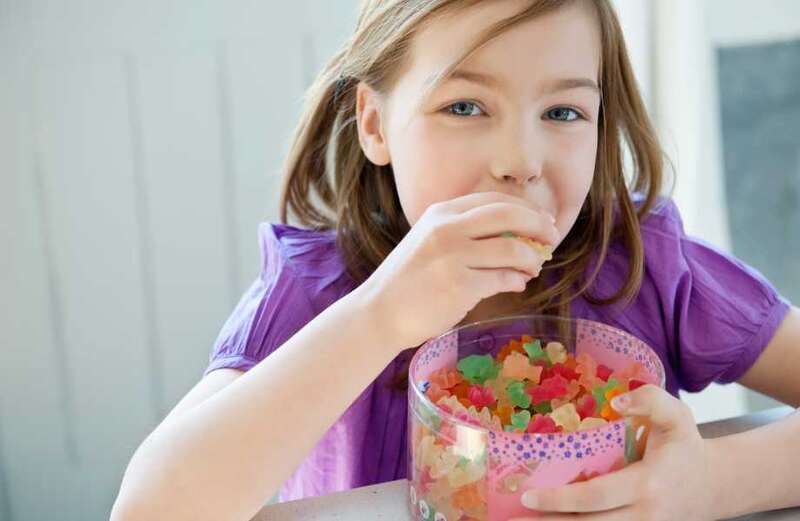AS shock new figures reveal the NHS spent a record £1.5 billion on diabetes drugs last year, it seems we are a nation addicted to sugar.
It’s estimated the average adult eats TWICE the recommended daily amount of free sugars and at Halloween children can consume up to 16 times the daily limit.

Naturopathic nutritionist Leisa Cockayne told Sun on Sunday Health: “The recommended daily amount for a man is around nine teaspoons of sugar, a woman should have six.
"It is recommended children aged four to six have no more than foiiur and a half teaspoons, while the limit for seven to ten-year-olds is six.
"But one can of cola often contains around 10 teaspoons.
 From tongue scraping to saying no, here are 12 health trends to try in 2023
From tongue scraping to saying no, here are 12 health trends to try in 2023
“Eating ultra-processed foods packed with sugar will quickly elevate glucose levels in the blood, followed by a steep decline.
"Over time, this increases your risk of type 2 diabetes.”
And the negative effects don’t end there.
Leisa, owner of makemesugarfree.com, said: “Excess sugar can cause hormone disruption, exacerbate menopause symptoms, trigger anxiety and contribute to fertility issues.
"Too much sugar may lead to an overgrowth of unhealthy gut bacteria that can lower immunity as well as an increased risk of cardiovascular disease, stroke and cancer.
“Giving children sugar treats makes them more susceptible to ongoing sugar addiction and cravings throughout their life.
"Sugar can also dysregulate a child’s mood, causing lethargy. Sugar is marketed as a sweet innocuous treat, it’s anything but.”
Here Leisa shares her tips for cutting down:
GO COLD TURKEY
When trying to control cravings, you need to totally reset your system at first and ditch all sugars — even those lurking in things like bread.
When you gradually reintroduce sugar you’ll find your palate is much more sensitive. Blueberries, apples and dates will taste incredibly sweet.
 I'm a nutritionist - here's the 10 best diet trends to help lose weight in 2023
I'm a nutritionist - here's the 10 best diet trends to help lose weight in 2023
PROTEIN BREAKFAST
Many people have “healthy” cereal and orange juice but these are loaded with sugar. This will spike your blood sugar.
Negate this with a protein-based breakfast such as scrambled eggs.
DON’T BUY IT
If tasty temptations lurk in your kitchen, they will make sugar cravings harder to resist. Ensure there is nothing handy to grab.
DITCH ARTIFICIAL SWEETENERS
When you eat sweetened food or drinks, you trick the body into thinking it will be getting the calories associated with sugar.
When these don’t materialise, it can lead to more cravings.
SLEEP
A lack of sleep can make us crave something sweet as our body wants a quick energy boost.
Establish a good routine, going to bed and waking up at roughly the same time each day.
SUPPLEMENT
Deficiency in some vitamins and minerals can lead to cravings.
Magnesium regulates insulin and glucose levels and makes you crave sugar if you are deficient.
It is found in whole grains, nuts and spinach. Vitamin D helps regulate hunger and it is best to take a supplement.
GO FULL-FAT
Many low-fat products are laced with sugar so they taste nice. We now know it’s sugar that is linked with type 2 diabetes, not fats.
'We were all addicted and giving up was hard'
HOSPICE caterer Jennie Rees, her partner Dan Harris, 49, an IT consultant, and kids Mollie, 17, and Harry, 11, gave up sugar for two weeks for Sun on Sunday Health.
The family, from Milton Keynes, Bucks, had been eating a combined 200g of sugar a day.

Jennie, 46, said: “We’re an active family and try to cook healthy meals, but we do love eating chocolate and sweets.
“I often had fizzy drinks for a quick energy hit and I love chocolate digestives. I was consuming 60g of sugar a day.
“Dan has sugar in his coffee and loves bread. He was eating almost double the recommended intake.
“When we gave up, Dan and I had headaches, felt shaky and nauseous and struggled to sleep.
"The kids hated getting out of bed and were moody.
“We were all addicted and giving up was hard.
“But after two weeks the withdrawal symptoms subsided, and Dan and I lost 2lb each.
“We did go back to eating some sugar but we are trying to cut down.”
'Adding up how much we ate was shocking'
GEMMA KEOGH and husband Stephen, both 36, and children Brianna, 13, Kenneth, ten, and Kayden, seven, from Manchester, also did our two-week experiment.
They were eating 250g of sugar a day.

Gemma said: “We had sugar in tea and the kids love sodas, sweets and chocolate.
"Adding up how much we ate was shocking.
“I cook dinner from scratch and make the kids healthy lunches but they are always sneaking biscuits.
"When I took it all out I had a headache which lasted three days. The kids struggled to concentrate.
"We usually sleep well but the kids were waking up all night.
"That went on for five days, but after a week we started to feel more energised. I lost 3lb, my skin glowed, and Brianna noticed her spots cleared up.
“We’ve cut sugar by two thirds and we all have lots more energy.
"After the withdrawal, we feel far better.”


































